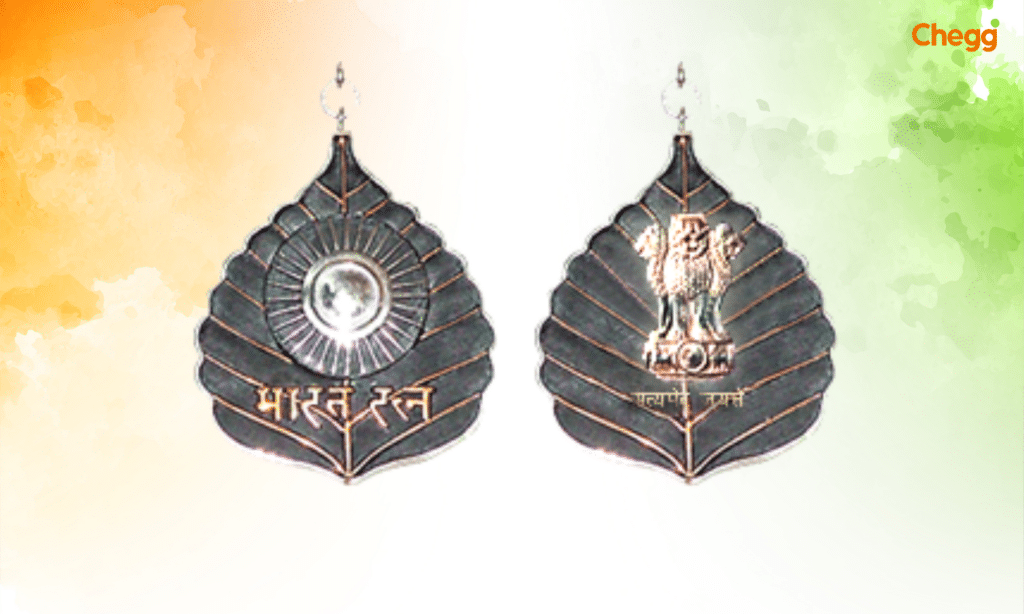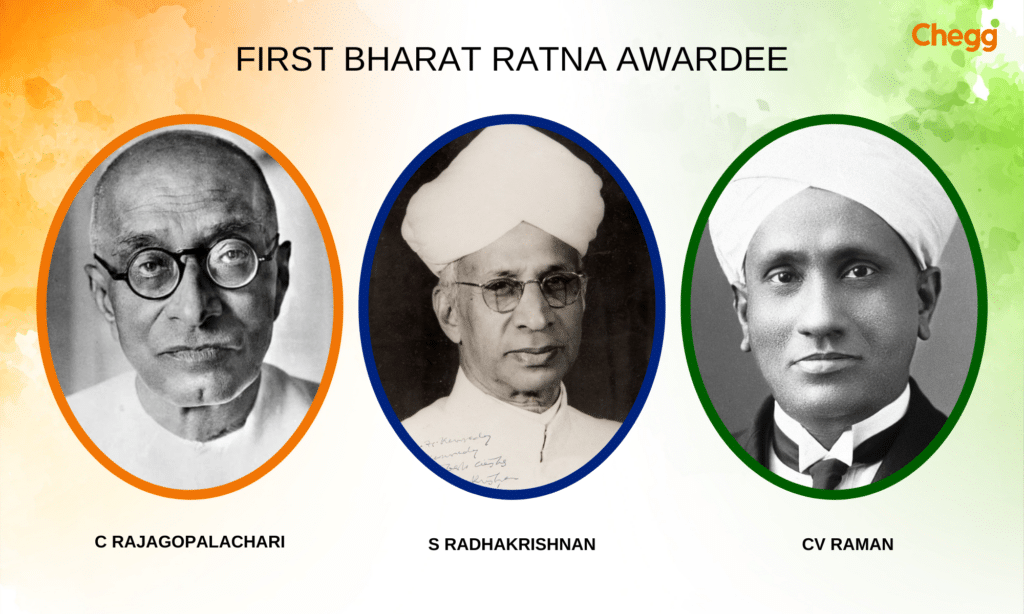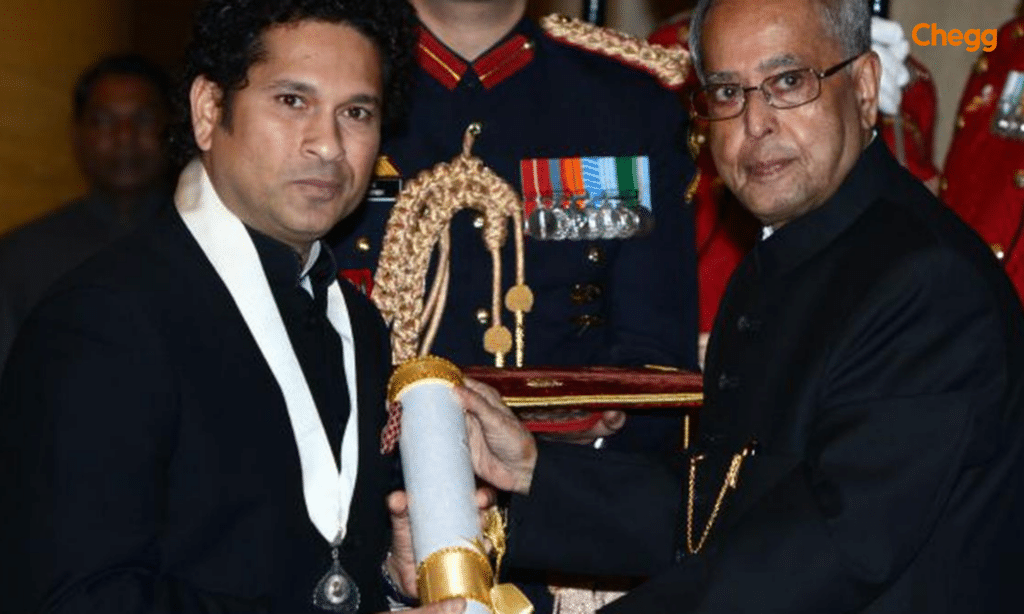
Quick Summary
Table of Contents
The Bharat Ratna, India’s highest civilian award, was established on January 2, 1954, by Dr. Rajendra Prasad, the nation’s first President. This prestigious honour recognizes individuals who have made significant contributions in various fields.
Each year, the Prime Minister nominates three recipients for the award. Winners receive a certificate called a Sanad, signed by the President. The medallion for the Bharat Ratna is shaped like a peepal leaf. Initially, the award focused on arts, literature, science, and public service, but in 2011, the Government expanded its scope to include any field of human endeavour.

The Bharat Ratna is India’s highest civilian honor, awarded for exceptional contributions in fields like public service, arts, science, literature, and sports. Here’s an overview of the eligibility and selection criteria:
The Bharat Ratna is awarded for exceptional service in:
The Bharat Ratna can be awarded posthumously to honor individuals who have passed away but made lasting contributions to the nation.
There is no fixed number of recipients each year. The decision rests with the President of India, based on the merit of the nominees.
A person can receive the Bharat Ratna Award only once. Re-awarding an individual is not allowed.
In rare instances, the Bharat Ratna Award may be given in extraordinary cases of national importance, such as posthumous recognition or in transformative historical contexts.
While the Bharat Ratna Award is intended to recognize genuine contributions, there have been discussions about the political influence on the selection process.
In 1954, these exceptional individuals received the Bharat Ratna for their outstanding contributions and service to the nation. Their legacy continues to inspire generations of Indians.

| Recipients (State/UT) | Year | About |
| C. Rajagopalachari/ Rajaji (Tamil Nadu) | 1954 | Lawyer, statesman, and activist |
| Sarvapalli Radhakrishnan (Tamil Nadu) | 1954 | First Vice-President and Second President of India |
| C. V. Raman (Tamil Nadu) | 1954 | Mathematicians, scientists, and physicists |
| Bhagwan Das (Uttar Pradesh) | 1955 | Educationist, activist, and philosopher |
| M. Visvesvaraya (Karnataka) | 1955 | Mysore’s Diwan, statesman, and civil engineer |
| Jawaharlal Nehru (Uttar Pradesh) | 1955 | Author and activist who held the position of Indian prime minister |
| Govind Ballabh Pant (Uttarakhand) | 1957 | First Chief Minister of Uttar Pradesh and activist |
| Dhondo Keshav Karve (Maharashtra) | 1958 | Social activist and Educator |
| Bidhan Chandra Roy (West Bengal) | 1961 | Social worker, educator, philanthropist, politician, and physician |
| Purushottam Das Tandon (Uttar Pradesh) | 1961 | Speaker of the United Provinces Legislative Assembly and activist |
| Rajendra Prasad (Bihar) | 1962 | Activist, lawyer, statesman, and scholar |
| Zakir Husain (Andhra Pradesh) | 1963 | Activist, economist, and education philosopher served as a Vice-Chancellor of Aligarh Muslim University and the Governor of Bihar |
| Pandurang Vaman Kane (Maharashtra) | 1963 | Indian scholar and Sanskrit expert, renowned for his five-volume literary composition |
| Lal Bahadur Shastri (Uttar Pradesh) * | 1966 | Activist and served as the second Prime Minister of India |
| Indira Gandhi (Uttar Pradesh) | 1971 | India’s first female prime minister |
| V. V. Giri (Odisha) | 1975 | Trade Unionist |
| K. Kamaraj (Tamil Nadu) * | 1976 | Former Tamil Nadu chief minister and independence fighter |
| Mother Teresa (West Bengal, born in North Macedonia) | 1980 | The founder of the Missionaries of Charity and a Catholic nun |
| Vinoba Bhave (Maharashtra) * | 1983 | Social reformer, activist, and close friend of Mahatma Gandhi |
| Khan Abdul Ghaffar Khan (Pakistan) | 1987 | First non-citizen and activist for independence |
| M. G. Ramachandran (Tamil Nadu) * | 1988 | Actor turned politician and Tamil Nadu chief minister |
| B.R. Ambedkar (Maharashtra) | 1990 | Social reformer, Dalit activist, principal drafter of the Indian Constitution, and the nation’s first law minister. |
| Nelson Mandela(South Africa) | 1990 | Head of the South African Anti-Apartheid Movement and President of South Africa |
| Rajiv Gandhi (Uttar Pradesh) | 1991 | India’s ninth prime minister |
| Vallabhbhai Patel (Gujarat) | 1991 | First Deputy Prime Minister of India and activist |
| Morarji Desai (Gujarat) | 1991 | Prime Minister of India and activist |
| Abul Kalam Azad (West Bengal) | 1992 | First Minister of Education and an activist |
| J. R. D. Tata (Maharashtra) | 1992 | Businessman and a philanthropist |
| Satyajit Ray (West Bengal) | 1992 | A director, filmmaker, writer, novelist |
| Gulzarilal Nanda (Punjab) | 1997 | Activist and the interim Prime Minister of India |
| Aruna Asaf Ali (West Bengal) | 1997 | Activist |
| A.P.J Abdul Kalam (Tamil Nadu) | 1997 | Aerospace and defense scientist |
| M. S. Subbulakshmi (Tamil Nadu) | 1998 | Carnatic classical vocalist |
| Chidambaram Subramaniam (Tamil Nadu) | 1998 | Activist and the Agriculture Minister of India |
| Jayaprakash Narayan (Bihar) | 1999 | Activist and social reformer |
| Amartya Sen (West Bengal) | 1999 | Economist |
| Gopinath Bordoloi (Assam) | 1999 | Activist |
| Ravi Shankar (Uttar Pradesh) | 1999 | Musician, sitar player |
| Lata Mangeshkar (Maharashtra) | 2001 | Singer |
| Bismillah Khan (Uttar Pradesh) | 2001 | Hindustani classical shehnai player |
| Bhimsen Joshi (Karnataka) | 2009 | Hindustani classical vocalist |
| C. N. R. Rao (Karnataka) | 2014 | Chemist and professor, author |
| Sachin Tendulkar (Maharashtra) | 2014 | Cricketer |
| Madan Mohan Malaviya (Uttar Pradesh) | 2015 | Scholar and educational reformer |
| Atal Bihari Bajpayee (Madhya Pradesh) | 2015 | Nine times elected Lok Sabha , and twice Rajya Sabha member, and Former Prime Minister of India for three terms |
| Pranab Mukherjee (West Bengal) | 2019 | Former President of India |
| Nanaji Deshmukh (Maharashtra) | 2019 | Social activist |
| Bhupen Hazarika (Assam) | 2019 | Playback singer, lyricist, musician, singer, poet, and filmmaker from Assam |
| Karpoori Thakur(Bihar) | 2024 | Former Chief Minister of Bihar |
| Lal Krishna Advani | 2024 | Former Bhartiya Janta Party Leader |
| MS Swaminathan(Thiruvananthapuram) | 2024 | Father of Green Revolution |
| Chaudhary Charan Singh(Uttar Pradesh) | 2024 | Former Prime minister who championed the farming industry and protected farmers’ rights |
| PV Narasimha Rao(Andhra Pradesh) | 2024 | Former Prime Minister |
There have been some controversies and suspensions related to the Bharat Ratna:

The Bharat Ratna is India’s highest civilian award, conferred by the President of India to honor exceptional contributions in fields such as literature, science, arts, public service, and sports.
The Bharat Ratna recognizes excellence in the following areas:
Several prominent individuals have received the Bharat Ratna for their exceptional contributions, including:
In recent years, the Bharat Ratna has been awarded to individuals from diverse backgrounds, such as:
While the Bharat Ratna is a prestigious honor, it has sparked debates regarding the selection process. Some argue that the decision-making lacks transparency, and political influences may occasionally play a role in who receives the award.
A few people have received posthumous Bharat Ratna Awards. That is to say, they received their honor after passing away. The list of Bharat Ratna awardees who received posthumous honors is provided here.
Over the period spanning from 1954 to 2024, several Presidents of India have been recipients of the prestigious Bharat Ratna Award. Among the 48 esteemed awardees, six Indian Presidents received the Bharat Ratna Award. The table below shows their names and the respective years when they were conferred with this honor:
| Presidents of India | Year of Award |
| Sarvapalli Radhakrishnan | 1954 |
| Rajendra Prasad | 1962 |
| Zakir Hussain | 1963 |
| A. P. J. Abdul Kalam | 1997 |
| Dr. V V Giri | 1975 |
| Pranab Mukherjee | 2019 |
The Bharat Ratna, India’s highest civilian award, is a mark of great honor and recognition. However, it does not come with monetary rewards or special legal privileges. Here are the key benefits and privileges that recipients of the Bharat Ratna enjoy:
The Bharat Ratna, India’s top civilian award, started in 1954. Anyone with the Bharat Ratna Award has contributed to improving humanity in any field, like science, literature, arts, public service, and sports, regardless of their job, gender, or racism. The Bharat Ratna Award can be given to three people annually. The winners receives the award from the Indian President.
The Bharat Ratna Award has been given to 16 persons posthumously. It means the person who has died can also receive the Bharat Ratna Award for their great contributions. As you have studied above the list of Awardees, all played an important role in the betterment of our country. We must take inspiration from them and always do hard work.

53 people have received the prize since 1954, including 18 who received it posthumously. In January 1966, an amendment to the original rules enabled the posthumous recognition of former prime minister Lal Bahadur Shastri. He became the first person to receive such an honor.
In 1954, the Bharat Ratna provision was instituted. Famous scientists Dr. Chandrasekhara Venkata Raman, lawyer and independence campaigner C. Rajagopalachari, and Sarvepalli Radhakrishnan, India’s first vice president, were the first to receive the esteemed honor.
This year Bharat Ratna has been awarded to Karpoori Thakur, Lal Krishna Advani, PV Narasimha Rao, Chaudhary Charan Singh, and MS Swaminathan.
Shrimati Indira Gandhi became the first female recipient of the Bharat Ratna award. She is referred to as India’s “Iron Lady.” She is India’s first female prime minister and its third overall.
A certificate signed by the President of India and a unique medallion shaped like a peepal leaf is given to the recipients. The prize, notably, comes with no financial grant. February 9, 2024
The youngest and first athlete to get the 2014 Bharat Ratna award was Sachin Tendulkar.
The 49th recipient of the Bharat Ratna was Pranab Mukherjee in 2019.
Renowned freedom fighter and political leader Jayaprakash Narayan is believed to have declined the Bharat Ratna. Additionally, Netaji Subhas Chandra Bose was posthumously awarded the Bharat Ratna in 1992, but the award was later withdrawn due to controversy over his death.
The 50th recipient of the Bharat Ratna was Bhupen Hazarika in 2019.
Also Read:-

Authored by, Amay Mathur | Senior Editor




Amay Mathur is a business news reporter at Chegg.com. He previously worked for PCMag, Business Insider, The Messenger, and ZDNET as a reporter and copyeditor. His areas of coverage encompass tech, business, strategy, finance, and even space. He is a Columbia University graduate.
Editor's Recommendations
Chegg India does not ask for money to offer any opportunity with the company. We request you to be vigilant before sharing your personal and financial information with any third party. Beware of fraudulent activities claiming affiliation with our company and promising monetary rewards or benefits. Chegg India shall not be responsible for any losses resulting from such activities.
Chegg India does not ask for money to offer any opportunity with the company. We request you to be vigilant before sharing your personal and financial information with any third party. Beware of fraudulent activities claiming affiliation with our company and promising monetary rewards or benefits. Chegg India shall not be responsible for any losses resulting from such activities.